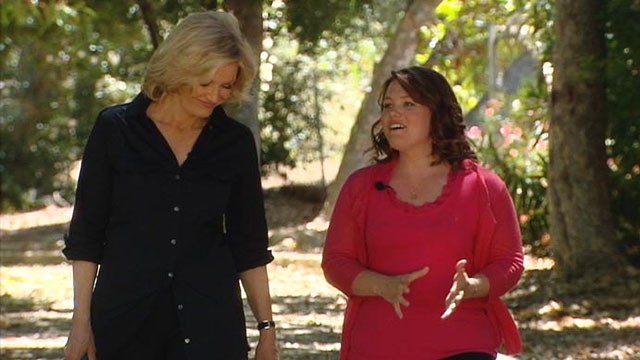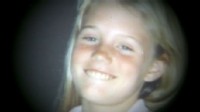Jaycee Dugard has powerful memories from the last 20 years, 18 of them spent as a prisoner of kidnappers Phillip and Nancy Garrido.
Yet, some of the most overwhelming memories come from her first two years of freedom which she and her children have spent reunited with her mother.
"Wow. Now I can walk in the next room and see my mom. Wow. I can decide to jump in the car and go to the beach with the girls. Wow. It's unbelievable. Truly," Dugard said in an exclusive interview with ABC News' Diane Sawyer.
Dugard was kidnapped by Phillip and Nancy Garrido when she was just 11 years old in 1991 and held captive in a backyard compound.
She was subjected to rape, manipulation and verbal abuse. She gave birth to two daughters fathered by her abductor in that backyard prison.
Dugard lived in virtual solitary confinement until her first daughter was born three years into captivity and wasn't allowed to spend time outdoors until after her second daughter was born, more than six years after her abduction.
She writes that the closest thing to freedom she ever felt in the compound was when she was allowed to live in her own tent and plant a small garden.
Now, Dugard is telling all in a new memoir, "A Stolen Life," and in her exclusive interview with Sawyer.
She's taking an unflinching look at the horror she's overcome and giving an unsparing account of the way a predator operates and how she survived.
"Why not look at it? You know, stare it down until it can't scare you anymore," she told Sawyer. "I didn't want there to be any more secrets…I hadn't done anything wrong. It wasn't something I did that caused this to happen. And I feel that by putting it all out there, it's very freeing," Dugard said.
Dugard, 31, remembers the first night after she and her daughters were rescued in 2009.
They spent the night in a motel room just down the hall from Dugard's mother, Terry Probyn.
Both Probyn and Dugard had held out hope throughout their nearly two decade separation that they'd find one another.
/ABC News
ABC News' Diane Sawyer sits down for an... View Full Size
Jaycee Dugard Dependent on Her Abductor Watch Video
Introducing Jaycee Dugard to Nancy Garrido Watch Video
Jaycee Dugard Pregnant at Age 14Watch Video
They had no idea that they'd been only 120 miles from one another the whole time.
"That night, I woke the girls [my daughters] up and I just said, "I'm so happy. I'm so happy!" Dugard said. "I ran down the hall…the girls are following me and knocking on the door…I walked in, 'I'm so happy! I'm so happy!"
Watch Diane Sawyer's Exclusive Interview With Jaycee Dugard on ABC News Sunday, July 10 at 9/8C
Simple firsts have brought healing to Dugard and her family: learning how to drive from the sister who was just a baby when Dugard was kidnapped, eating family dinners around a table instead of the fast food that Phillip Garrido fed her for 18 years, and even just saying her name which was forbidden by her captors.
Still, the sounds of her imprisonment haunt her.
"That lock. Hearing the lock...for some reason that and the bed squeal. It was a squeaky bed…I guess the noise, the sound. Weird what sticks in your head," Dugard said.
Dugard remembers trying not to cry when she was first abducted because it was too hard to wipe tears away with her hands cuffed behind her back.
"I didn't really want to, because then you can't wipe them away, you know? Then you get all sticky and …then they get itchy," Dugard said.
She says she had no choice but to endure.
"There's a switch that I had to shut off," she said. "I mean, I can't imagine being beaten to death, you know? And you can't imagine being kidnapped and raped, you know? So, it's just, you just do what you have to do to survive."
Two of the most challenging moments for Dugard were giving birth to her two daughters in 1994 and 1997.
"I knew there was no hospital," she said. "I knew there was no leaving."
At just 13 years old, Dugard noticed she was putting on weight but didn't know why.
On a Sunday in 1994, the Garridos told her she was pregnant.
Before her abduction, the little girl who sold Girl Scout cookies and wrote stories, knew nothing about sex.
Dugard writes that giving birth was the most painful experience in her life.
"And then I saw her. She was beautiful. I felt like I wasn't alone anymore. [I] had somebody else who was mine…and I know I could never let anything happen to her. I didn't know how I was going to do that, but I did," she said.
The Kidnapping
Dugard remembers the last time she left her family's Tahoe, Calif., home to walk to her fifth grade classroom on June 10, 1991.
She'd packed her peanut butter and jelly lunch, worn her favorite kitty shirt and a butterfly ring given to her by her mother.
In all pink, she started on her walk.
"And [I] walked up the side of the hill…that was the safe way to go against traffic. And halfway up, my world changed in an instant," Dugard said. "I heard a car behind me."
Creeping behind Dugard were Phillip and Nancy Garrido. Phillip Garrido rolled down his car window.
"His hand shoots out and I just feel numb. My whole body is tingly…I fall back in the bushes," Dugard said.
Garrido had shocked her with a stun gun. Panicked, Dugard scooted back towards the woods. She remembers grasping a sticky pinecone, the last thing she touched while free.
Now, she wears a pinecone charm around her neck to symbolize her freedom.
"It's a symbol of hope and new beginnings and that there is life after something tragic."
After shocking her, the Garridos stuffed her into their car, hid her under a blanket in the backseat.
Nancy Garrido sat on her while Phillip Garrido drove to the couple's Antioch, Calif., home.
"It was so hot," she said. "I remember my throat felt very dry and scratchy and like I had been screaming, but I don't remember screaming," she said.
Dugard remembers hearing Phillip Garrido laugh and say, "I can't believe we got away with it."
"It was like the most horrible moment of your life times ten," she said.
When they arrived at their home, Dugard was stripped of her backpack, her pink clothes and her name. Garrido took her to the bathroom and told her she had to be quiet.
"I guess he wanted me to be clean…very scary. I was scared," Dugard said.
Dugard was forced to wear nothing but a towel at first and was locked in a semi-soundproof room that had only one window.
Somehow, Phillip Garrido missed the pinky ring her mother had given her. She'd hold onto that ring throughout her captivity. She'd also hold onto the hope that she'd see her mom again.
Clinging to the Memory of Her Mother
"I wondered if she found out what had happened to me, if she was looking for me," Dugard said.
Dugard worried that she'd forget what her mother looked like. She'd keep journals referring to her mother as just "her" because to write "mom" was just too painful.
Her mom, Terry Probyn, carried out a frantic search for her daughter, making tearful pleas on television.
She'd continue to hold vigils for her daughter when public interest in the family's plight waned.
"I feel like I spent my lifetime looking for her and dreaming about her and talking to you and you were always there. You never left me," Probyn told Dugard during the interview.
The two women, clinching hands and with their bodies turned toward one another, share a remarkable bond.
"Being a mom now, you know, I know that she never forgot about me because I could never forget about my kids. But…when you're a kid and you think you're easily forgettable and you're not important. But she kept…her hope. I don't know how she did that. You know? How did I keep my hope? How did she keep her hope," Dugard said.
Dugard still fights feelings of anger towards her captors, but tries not to dwell on them.
"I don't feel like I have this rage inside of me that's building," Dugard said. "I refuse to let him have that. He can't have me."
Dugard's mother can't forget what the Garridos stole from her daughter and her.
"I think I have enough hate in my heart for the both of us. I hate that he took her life away and that makes me sad…I hate that he stole her from me. He ripped out a piece of my heart and he stole my baby," Probyn said.
The two women look at one another. Probyn tells her, "I'm sorry, baby."
She goes on, "He stole your adolescence. He stole high school proms and had pictures and memories…"
Dugard smiles and tells her mom, "But he didn't get all of me."
The Manipulation
The Garridos mercilessly manipulated Dugard.
When she was first kidnapped, Phillip Garrido kept a stun gun present whenever he raped her, a way to remind her of his power.
After abusing Dugard, sometimes for hours in drug fueled sex binges called "runs," he would sob and apologize.
He'd tell her that he had a sex problem and she was saving him from hurting other little girls.
While Philip Garrido was her main tormentor, his wife Nancy was equally adept at playing with Dugard's emotions. She would bring Dugard things like a purple bear, a Barbie, chocolate milk, a Nintendo.
But she never stopped her husband from abusing Dugard.
She'd even keep Dugard locked in the compound when Phillip Garrido was away serving time for a parole violation.
"In some way, she's just as manipulative, because she would cry and say, 'I can't believe that he did this. I wish he would have got a headache that morning he took you,'" Dugard recalled.
"In some ways, she's…just as evil as Phillip," Dugard said.
The Garridos manipulated Dugard until the presence of a stun gun and the use of handcuffs were no longer needed to keep her from fleeing.
It was classic manipulation, Dugard's therapist, Dr. Rebecca Bailey, said.
Bailey is a family unification therapist.
Phillip Garrido's power over Dugard grew by being "responsible for everything from time to food to human companionship to your clothes to your identity," Bailey said.
When Dugard had her daughters, she didn't flee because Phillip Garrido had convinced her the world outside their compound was unsafe, ironically full of pedophiles and rapists.
Even now, it's still hard for Dugard to fully understand why she didn't leave.
"I've asked myself that question many times. I know there was no leaving. The mind manipulation plus the physical abuse I suffered in the beginning, there was no leaving…. I don't know what it would have took. Maybe if one of the girls were being hurt," Dugard said.
Coping With Captivity
Dugard coped with the manipulation by keeping journals, writing stories and dreams that allowed her to imagine herself in a life outside of the compound.
While the Garridos stripped her of her innocence, they could not strip her of her imagination.
She would come up with stories about the tree outside the window, she named the spider in her room, she wrote in her journals about falling in love one day, riding in a hot air balloon, being a veterinarian.
Throughout her captivity, she would take care of several cats and other animals.
When she became a mother, she turned a corner of the compound into a school for part of the day.
She remembered how she used to play school as a little girl, but now she was responsible for actually educating two little girls.
She made a regimen of classes during the day with worksheets and lessons she found online.
She mothered her girls even though the Garridos forbid the children from calling Dugard "mom."
Nancy Garrido, jealous of Dugard, required that the children call her "mom."
Even with access to the computer, Dugard said she never searched for her mother or for news accounts of her kidnapping.
She was scared to because of the Garridos' manipulation.
The Rescue and the Future
Dugard and her daughters would be rescued in August 2009 after an increasingly paranoid and delusional Phillip Garrido alarmed two campus police officers, Ally Jacobs and Lisa Campbell.
He'd shown up on the University of California, Berkeley, campus with the two daughters he'd fathered with Dugard.
The campus officers, both moms, did something nobody else had done.
They saw a man haranguing and they talked to him, engaged him and then acted on their suspicion.
A background check revealed he was a convicted sex offender.
When they called his parole officer to ask about his two daughters, the parole officer didn't even know that Phillip Garrido had children.
Over the 18 years Jaycee Dugard was in captivity, parole officers had visited the home at least 60 times and never reported anything amiss.
Phillip Garrido was called to a meeting with his parole officer on Aug. 26, 2009. He brought his wife, Dugard and the two girls.
At first, Dugard lied for Garrido, still under the spell. She eventually confessed who she was by writing her real name down.
In her memoir, she says that writing her name was like an extinguished flame reigniting.
"The light came back…it was very dark for so long…but that light finally came back on," she said.
Dugard is savoring her freedom and planning for the future.
"I would like to study writing, you know? Really, because I love words and I love mythology…the way metaphors work and how [you] can see things differently with words," she said. "It helped me get through a lot of days, my imagination."
Dugard wants her book, her story to help people realize there is a way to triumph over tragedy and survive. And for her captors, both locked away in prison, she has a message.
"[You] can't steal anything else," she said.
MORE FROM ABC NEWS
- Jaycee Dugard Describes Giving Birth After Kidnapping
- Jaycee Dugard: 'Life After Something Tragic'
- Early Termination from Federal Parole: Phillip Garrido 'Thanked for Cooperation'
- 'How Did It Fail So Badly?': 1976 Garrido Victim Blames Parole System for Dugard




No comments:
Post a Comment